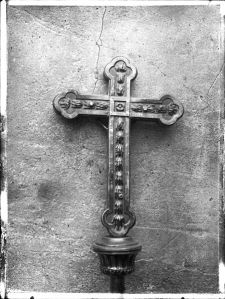G.K. Chesterton once said that “Tradition means giving a vote to most obscure of all classes, our ancestors. It is the democracy of the dead…Tradition refuses to submit to the small and arrogant oligarchy of those who merely happen to be walking about. All democrats object to men being disqualified by the accident of birth; tradition objects to their being disqualified by the accident of death. Democracy tells us not to neglect a good man’s opinion, even if he is our groom; tradition asks us not to neglect a good man’s opinion, even if he is our father.”
To honor that sentiment and to stave off an easy chronological snobbery, today’s post comes straight from the mouths (or pens) of men and women who have died in the faith.
From Dorothy Sayers‘ CREED OR CHAOS
The problem of sin and evil is, as everybody knows, one which all religions have to face, especially those that postulate an all-good and all-powerful God. “If,” we say readily, “God is holy and omnipotent, He would interfere and stop all this kind of thing” – meaning by “this kind of thing” wars, persecutions, cruelty, Hitlerism, Bolshevism, or whatever large issue happens to be distressing our minds at the ever large issue happens to be distressing our minds at the time. But let us be quite sure that we have really considered the problem in all its aspects.
 “Why doesn’t God smite this dictator dead?” is a question a little remote from us. Why, madam, did He not strike you dumb and imbecile before you uttered that baseless and unkind slander the day before yesterday? Or me, before I behaved with such cruel lack of consideration to that well-meaning friend? And why, sir, did He not cause your hand to rot off at the wrist before you signed your name to that dirty little bit of financial trickery?
“Why doesn’t God smite this dictator dead?” is a question a little remote from us. Why, madam, did He not strike you dumb and imbecile before you uttered that baseless and unkind slander the day before yesterday? Or me, before I behaved with such cruel lack of consideration to that well-meaning friend? And why, sir, did He not cause your hand to rot off at the wrist before you signed your name to that dirty little bit of financial trickery?
You did not quite mean that? But why not? Your misdeeds and mine are nonetheless repellent because our opportunities for doing damage are less spectacular than those of some other people. Do you suggest that your doings and mine are too trivial for God to bother about? That cuts both ways; for, in that case, it would make precious little difference to His creation if He wiped us both out tomorrow…
The Church, at any rate, says that man’s will is free, and that evil is the price we pay for knowledge, particularly the kind of knowledge which we call self-consciousness. It follows that we can, by God’s grace, do something about the pattern. Moreover, God Himself, says the Church, is doing something about it – with our cooperation, if we choose, in despite of us if we refuse to cooperate – but always, steadily, working the pattern out…
The Church asserts that there is a Mind which made the universe, that He made it because He is the sort of Mind that takes pleasure in creation, and that if we want to know what the Mind of the Creator is, we must look at Christ. In him we shall discover a Mind that loved His own creation so completely that He became part of it, suffered with and for it, and made it a sharer in His own glory and a fellow worker with Himself in the working out of his own design for it…We find God continually at work turning evil into good.